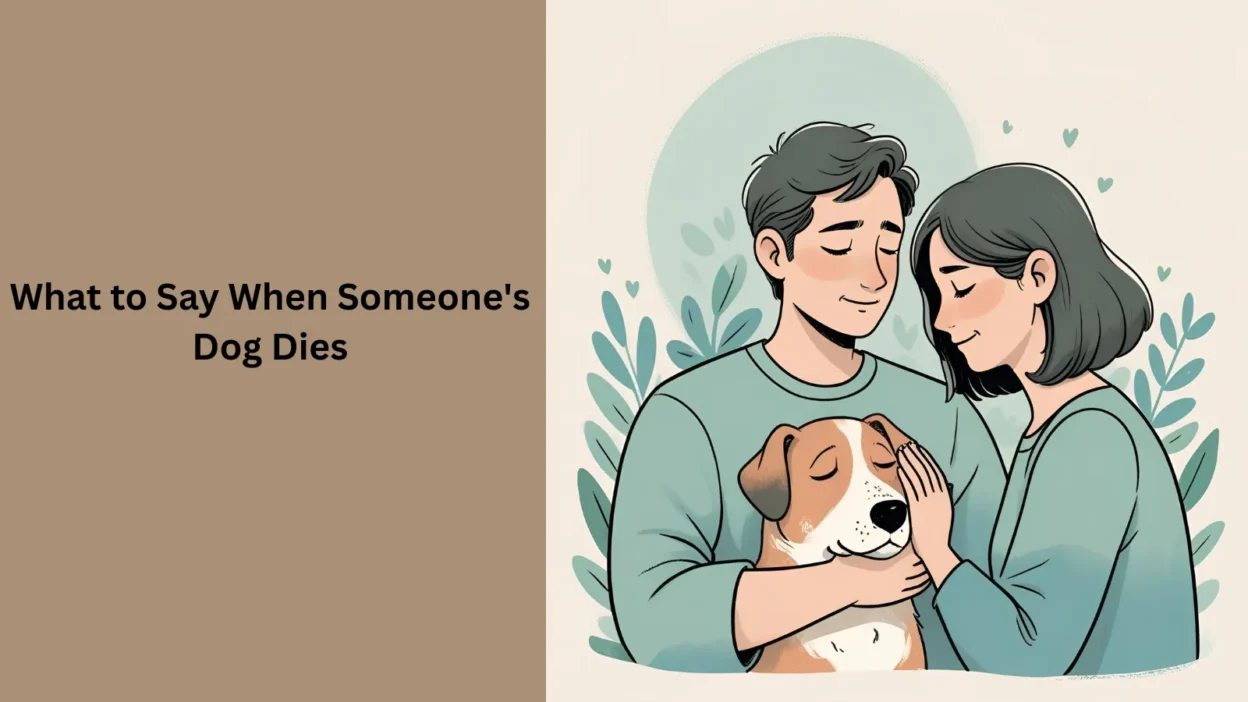Losing a dog feels like losing a family member. The pain is raw, and words often fall short when you want to comfort someone grieving. If you’ve ever wondered what to say when someone’s dog dies, you’re not alone.
Pets bring joy, loyalty, and love, so their loss leaves a void. Saying the right thing can ease their hurt, even just a little. This guide offers heartfelt ways to show support, avoid common mistakes, and be there for someone during this tough time.
Whether it’s a friend, coworker, or neighbor, your words matter. Let’s explore how to offer kindness and empathy when a furry friend passes away.
Why Words Matter When a Dog Dies
Words carry weight during grief. A thoughtful message can make someone feel seen, while a careless one might sting. Dogs aren’t “just pets”—they’re companions who share daily routines and unconditional love. When someone’s dog dies, they may feel isolated in their sorrow. Acknowledging their loss shows you understand its depth.
Scenario: Your coworker mentions their dog passed away. Instead of saying, “It was just a dog,” try, “I’m so sorry about Max. He sounded like such a loyal friend.” This validates their emotions. Avoid phrases like “You can get another dog” — it dismisses their unique bond. A simple, sincere condolence goes a long way.
How to Offer Comfort Without Overstepping
Offering comfort means listening more than talking. Grief is personal, and some people may not want to dive into details. Start by expressing sympathy and letting them guide the conversation. Being present is more powerful than finding “perfect” words.
Example: Your neighbor’s dog died. You say, “I’m so sorry about Bella. I know she meant the world to you. I’m here if you want to talk.” This opens the door without pushing. Don’t say, “You’ll feel better soon,” as it might feel like you’re rushing their grief. If they share memories, listen and respond with, “She sounds like she was so special.” Small gestures, like a card or a text, also show you care.
What to Say in a Sympathy Card
Writing a sympathy card can feel tricky, but it’s a kind way to show support. Focus on the dog’s impact and the person’s feelings. Personalize your message by mentioning the dog’s name or a memory, if you know one.
Use Case: Your friend’s dog, Rusty, passed away. Write, “Dear Sarah, I’m heartbroken to hear about Rusty. His wagging tail always brightened my day. Thinking of you.” This is specific and warm. Avoid generic phrases like “Sorry for your loss” without context — they can feel distant. If you didn’t know the dog, try, “I’m so sorry about your pup. I can only imagine how much you miss them.” Keep it short, sincere, and focused on their bond.
Things to Avoid Saying
Some phrases, even if well-meant, can hurt more than help. Comments that downplay the loss or suggest quick fixes often feel dismissive. Think before you speak to avoid adding to their pain.
Scenario: Your cousin’s dog died. Don’t say, “At least he was old,” or “You can adopt again.” These imply the loss is less significant. Instead, try, “I know how much you loved Daisy. I’m here for you.” Steer clear of comparisons, like “I know how you feel, my cat died last year.” It shifts focus to you. Focus on their grief with words like, “This must be so hard. I’m thinking of you.”
Supporting Through Actions, Not Just Words
Sometimes, actions speak louder than words. Offering help shows you care beyond saying what to say when someone’s dog dies. Small gestures can ease their burden during grief.
Example: Your friend is grieving their dog. Say, “I’m so sorry about Luna. Can I bring you dinner this week or walk with you sometime?” This offers practical support. Don’t assume they want company — ask first. Avoid saying, “Let me know if you need anything,” as it puts the burden on them. Dropping off a treat or sharing a photo of their dog with a note like, “Found this pic of Max — he was so sweet,” can also mean a lot.
Handling Conversations With Sensitivity
If the person wants to talk, be a compassionate listener. Let them share stories about their dog without judgment. Show empathy by reflecting their feelings and avoiding unsolicited advice.
Use Case: Your colleague opens up about their dog’s passing. Say, “I can see how much you loved Buddy. What was he like?” This invites them to share. Don’t interrupt with solutions like, “Maybe get a new puppy.” If they cry, reassure them with, “It’s okay to feel this way. Buddy was so lucky to have you.” Keep the focus on their emotions and the dog’s special place in their life.
Final Thoughts
Knowing what to say when someone’s dog dies is about showing heart and understanding. Dogs leave paw prints on our lives, and their loss hurts deeply. Whether you offer a kind word, a listening ear, or a small gesture, your support matters.
Avoid dismissive phrases and focus on the love they shared with their pet. By being thoughtful, you can help them feel less alone in their grief. Next time you’re unsure, just speak from the heart — a little kindness goes a long way.




